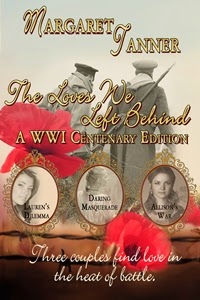My novel His Brother's Bride is very roughly based on my grandparent's story. We lived with my grandparents when I was younger and I can vividly remember my grandfather shaving and picking bits of shrapnel out of his face. This was many years after the end of World War One. Both Grampa Pritchard and his brother came to Canada as Dr. Barnardo's home children. They were shipped from Liverpool sheltering homes to eastern Ontario. Although they came a year apart, they were fortunate enough to end up close to each other near Eaganville Ontario. Grampa was given to the Wilcox family, Uncle Joe with the Mills. When World War One broke out he volunteered and lied about his age in order to be sent to Europe. His brother, my great Uncle Joe, enlisted after Grampa did.
Grampa was a sapper and part of the engineering corps who went ahead to set up first aide areas and infrastructure. Along with others, he was buried for three days in rubble when the area they were working in was bombed. He was also gassed with mustard gas on six different occasions.
Uncle Joe was a private in the 21st Battalion of the Canadian Infantry (Eastern Ontario Regiment) and was lost on August 8, 1918 in an early morning Somme offensive near the village of Marcelcave at the age of 25. He is buried in France at Crucifix Corner Cemetary Villers-Bretonneux which is a village in the Department of the Somme, on the road from Amiens to St Quentin. CRUCIFIX CORNER CEMETERY is south of the village at the crossing of the road to Demuin and the road from Cachy to Marcelcave.
Following the war, the British War Medal, Victory Medal, Plaque (Dead Man’s Penny) and Scroll were sent to his brother, Herbert Pritchard, c/o C.B. St. George, Sprucedale, Ontario
I wrote the following poem for Uncle Joe.
Somme Sleep
Crouched and ready we wait,
Dawn is late in coming
And when it does it is shrouded
In mist and fog
It is more than the damp and wet
That sends the shivers over our skin
Anticipation and fear war with each other
Where are the tanks that are supposed to support us?
Sky and earth merge when we peek over the top
Stitched together by mizzle and mist
Yards away, across the trampled earth
The enemy crouch and wait as we do
Where are the tanks? The support?
Whispers and rumours run up and down the line
Then—suddenly the wait is over
“Over the top, boys,” the sergeant yells
And we go
Surging out of our earthen burrows
Running, firing blind, blinking in the fog
No time to think, only to run and fire
Ducking bullets whining by our ears
Then—it stops
I open my mouth and spit mud
Blood, hot and cold runs through my fingers
The old guys were right
There is no pain when it happens
Just a mixed sensation of disbelief
And relief…
Even if I die right here in the mud
It’s over:
The fear;
the wet;
the lice;
the killing.
Somewhere my mates are yelling and shots echo
But around me there is an odd silence
A separation from the man-made hell
One hand clutching my gut,
the other somehow still wrapped around my rifle
I let the lark song sing me to sleep.
Copyright 2020 Nancy M Bell





























.jpg)


.jpg)


